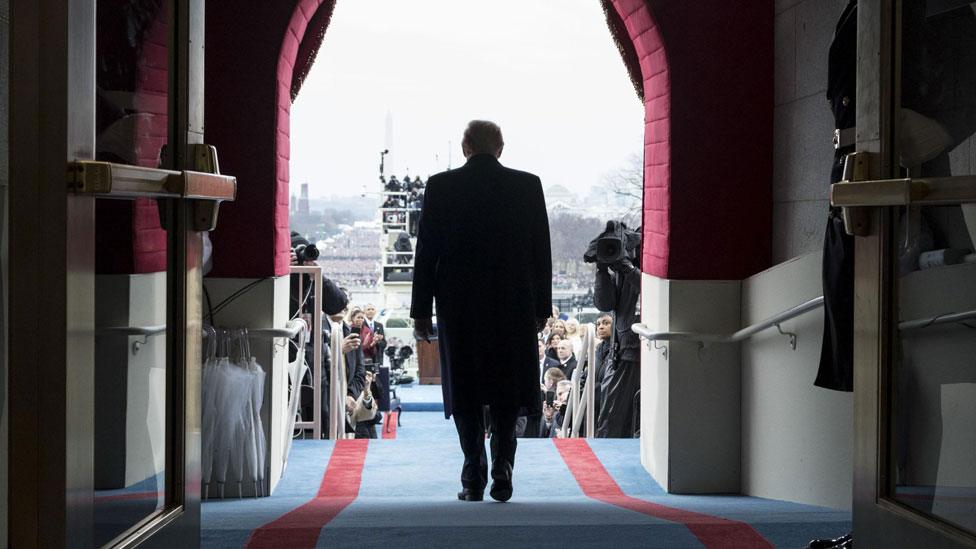Impeachment inquiry: Five key moments from Sondland hearing
- Published
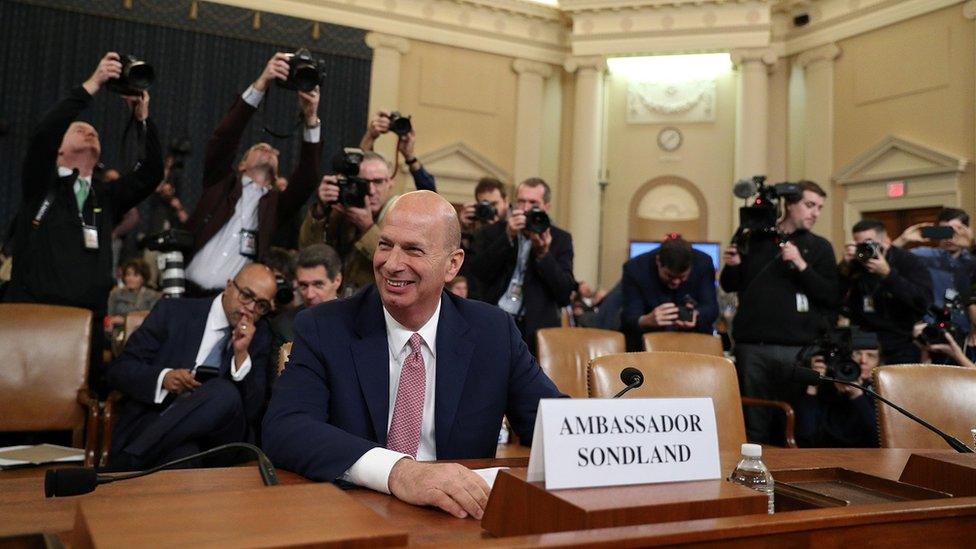
The fourth day of televised impeachment hearings has heard arguably the most important testimony yet.
The Democratic-led inquiry is trying to determine if President Trump improperly brought pressure on Ukraine to force it to investigate one of his political rivals, former Vice-President Joe Biden.
On Wednesday, US Ambassador to the European Union Gordon Sondland said not only was there a "quid pro quo" but he and other officials were acting under direction from the president himself.
Here are the key five moments with analysis from the BBC's North America reporter Anthony Zurcher.
1. 'We did not want to work with Mr Giuliani'
The impeachment saga involves a vast cast but one of the central figures is President Trump's personal lawyer Rudy Giuliani. In his opening remarks Mr Sondland said he, the Secretary of Energy Rick Perry and Kurt Volker, former special representative to Ukraine, worked closely with Mr Giuliani at President Trump's behest.
What he said: "Secretary Perry, Ambassador Volker and I worked with Mr Rudy Giuliani on Ukraine matters at the express direction of the President of the United States. We did not want to work with Mr Giuliani. Simply put, we played the hand we were dealt. "
Anthony's take: There have been some efforts by the president's defenders to paint Rudy Giuliani as operating in Ukraine independently of the White House. This makes some sense, given his penchant for vocal and sometimes unsteady television appearances, along with testimony from others that he was the one putting the greatest pressure on Ukrainian officials to open investigations that could harm Democrats and the Bidens. Giuliani's image has also been tarnished by the indictment of two of his business associates and reports of criminal investigations into his own activities.
Right off the bat, however, Sondland draws a direct line from Donald Trump to Giuliani. If anyone wanted to be involved in Ukrainian policy, Sondland said, they were going to have to work with the former New York mayor. It was just that simple.
Mr Giuliani is alleged to have sought to dig up dirt on Democrat candidate Joe Biden
2. 'Communications with Pompeo'
There have also been questions over what Secretary of State Mike Pompeo knew. Mr Sondland said he kept in contact with him and the National Security Council (NSC), a key advisory council to the White House.
What he said: "We kept the leadership of the State Department and the NSC informed of our activities. That included communications with Secretary of State Pompeo."
Analysis: Another White House defence has been to characterise Sondland himself as a foreign policy freelancer and that he may have been mischaracterising what the president wanted and was operating a "shadow" foreign policy outside of the normal channels.
Sondland countered that he was the proper channel because the president wanted him to be - and that he was keeping Mike Pompeo, then-National Security Advisor John Bolton, acting chief of staff Mick Mulvaney and other White House officials appraised of all his activities. He even noted that he told Vice-President Mike Pence of his concerns that US aid to Ukraine was being withheld (something the Pence office has since denied).
"Everyone was in the loop," Sondland said. "It was no secret."
This was, in other words, an administration-wide policy - and Democrats have been quick to note that many of those administration officials have refused to testify in the impeachment hearings.
EU ambassador Gordon Sondland testifies that Trump's personal lawyer "requests were a quid pro quo"
3. 'The July 26 phone call'
US official David Holmes has claimed he heard Mr Sondland and President Trump discussing if Ukrainian President Volodymyr Zelensky was going to start the Biden investigations over the phone on July 26. Sondland did not mention the phone call with Mr Trump in his first testimony. He would address it directly this time.
What he said: "Actually, I would have been more surprised if President Trump had not mentioned investigations, particularly given what we were hearing from Mr Giuliani about the President's concerns."
Analysis: One of the big revelations from acting US Ambassador to Ukraine Bill Taylor's testimony last week was that an aide, now known to be David Holmes, overheard a 26 July phone call between Trump and Sondland.
Sondland, in his Wednesday morning hearing appearance, confirmed this phone call and that the two men discussed "the investigations" the president wanted Ukraine to launch.
Although Sondland says he didn't know at the time, the day before that call Trump had directly asked Ukrainian President Volodymyr Zelensky to investigate one of his political rivals, Democrat Joe Biden.
The president has repeatedly said that he barely knew Sondland, but according to this testimony the two knew each other well enough to have an unsecure phone call moments after he met Ukrainian officials.
What we know about Biden-Ukraine corruption claims
4. 'Two plus two equals four'
Mr Sondland said he believed military aid was held up to put pressure on Ukraine. He said he had never directly heard Mr Trump link the withholding of military aid from Ukraine with his desire for the country to launch investigations that might benefit him but said he could draw that conclusion.
What he said: "President Trump never told me directly that the aid was conditioned on the meetings. The only thing we got directly from (Trump's personal lawyer Rudy) Giuliani was that the Burisma and 2016 elections were conditioned on the White House meeting. The aid was my own personal, you know, guess, based again on your analogy two plus two equals four."
Analysis: Sondland was very clear in his testimony that a White House visit by Ukrainian President Zelensky was conditioned on Ukraine launching investigations that could be politically helpful to Trump.
"Was there a quid pro quo?" Sondland asked. "As I testified previously, with regard to the requested White House call and White House meeting, the answer is yes."
What Sondland said he did not initially understand, however, was that US military aid to Ukraine was also being held to increase pressure on Ukraine.
Under questioning, he testified that while he was not directly told why military aid was being held up, it eventually became as obvious to him as "two plus two equals four".
Republicans say that this is unfounded speculation on Sondland's part and fiercely contest the conclusion. That's because while it would be troubling if a White House visit was being used to pressure Ukraine, it's significantly more serious if congressionally authorised aid to a nation fighting a war for its survival was at play, as well.
'I want nothing' - Trump re-enacts Sondland call
5. 'He had to announce the investigations'
Mr Sondland said Mr Trump had wanted Ukraine's investigations to be announced but he had never heard anyone say that they had to start. He only heard that they needed to be announced.
What he said: "He had to announce the investigations, he didn't have to do them as far as I understand. I don't want to characterise whether they were of value or not, again through Mr Giuliani, we were led to believe that was what he wanted."
Analysis: Donald Trump's defenders have characterised the pressure being applied to Ukraine as simply part of a larger administration effort to combat corruption in nations that receive US foreign aid.
Under questioning, however, Sondland agreed that the key goal for which they were pushing, at the behest of Rudy Giuliani, wasn't necessarily a thorough and complete corruption investigation on the part of the Ukrainians. Instead, it was simply the public announcement of such an investigation.
This, Democrats are sure to argue, is because there was a purely political motive for this investigation push. It would give the president a means to attack the man who could be his Democratic adversary in the 2020 presidential campaign, Joe Biden.
Beyond that, in the colourful words of diplomat David Holmes in his testimony Saturday, Trump couldn't give an expletive about what happens in Ukraine.

Learn more about Trump and impeachment inquiry

SIMPLE GUIDE: A basic take on what's going on
GO DEEPER: Here's a 100, 300 and 800-word summary of the story
WHAT'S IMPEACHMENT? A political process to remove a president
VIEW FROM TRUMP COUNTRY: Hear from residents of a Pennsylvania town
ON THE DOORSTEP: A Democrat sells impeachment to voters
FACT-CHECK: Is the whistleblower linked to Democrats?
CONTEXT: Why Ukraine is important to the US

- Published21 November 2019
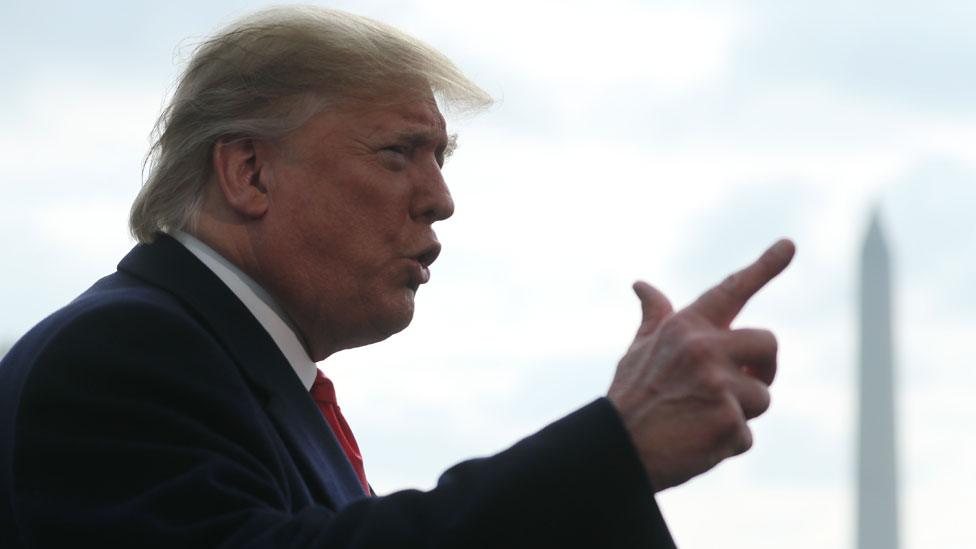
- Published20 November 2019
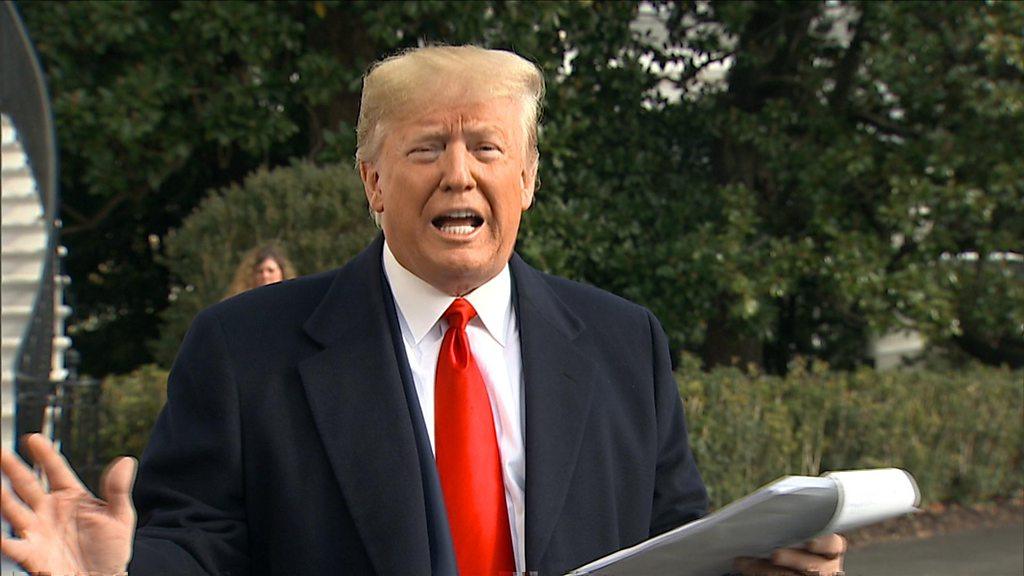
- Published5 February 2020
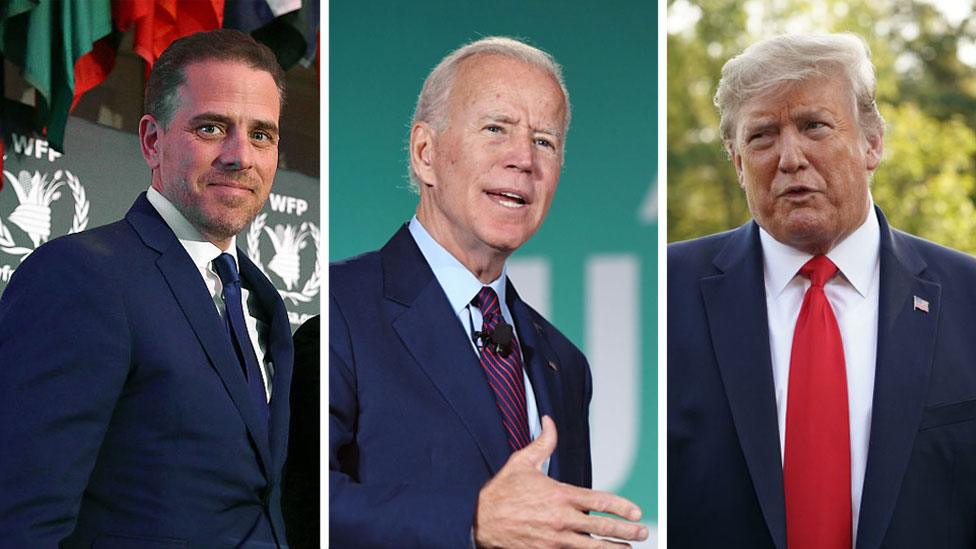
- Published19 December 2019
